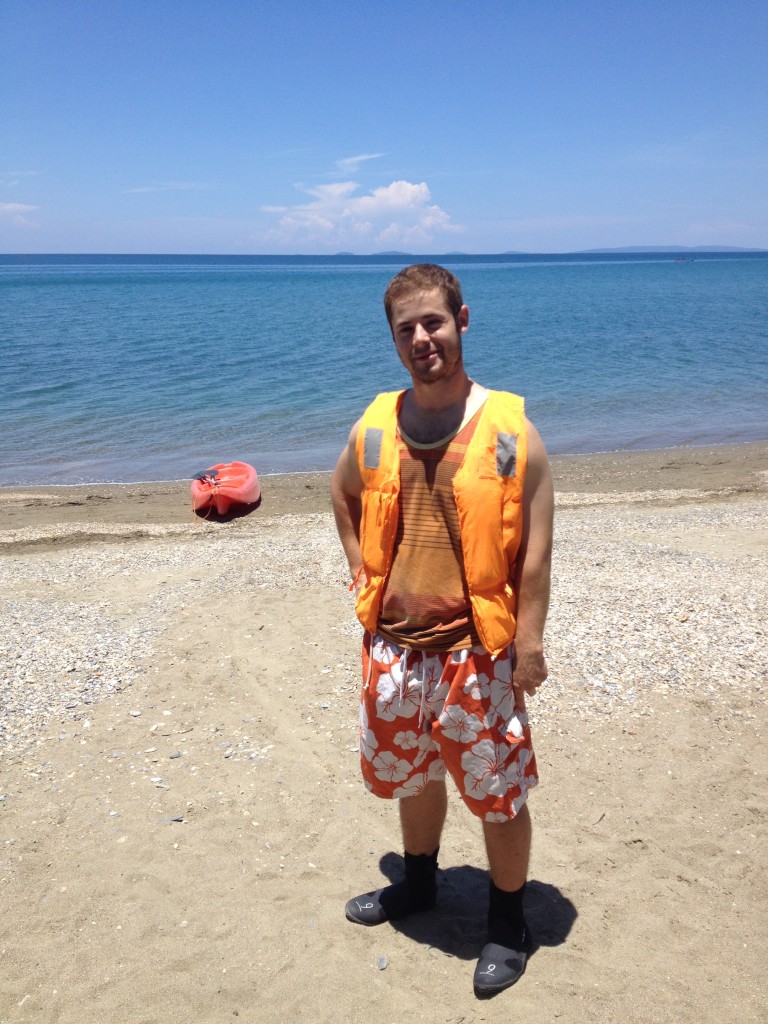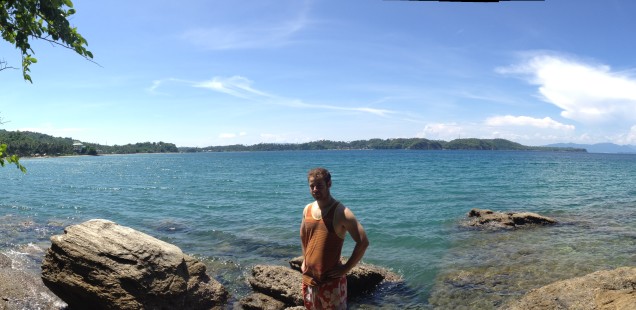
Scuba Diving Lessons For The Location Independent
I’m living in the Philippines now. I’ll be here for two months before leaving for Hong Kong.
I’ve working through an ‘internship’ for a resort out here, exchanging marketing work for room and board. I was looking for the ‘tropical island paradise’ and I guess I found it.
While out here, I got my PADI scuba certification. Working with an instructor, I learned about all of the relevant gear and took a few practice dives.
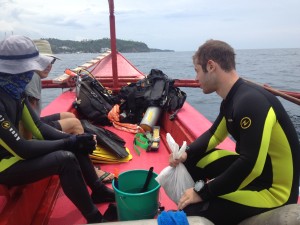
The environment below the surface is beautiful. Corals of all colors reach up towards you while brightly colored fish dart through the underwater forest.
Clownfish defending their anemone homes stare you down and, on occasion, charge at your mask.
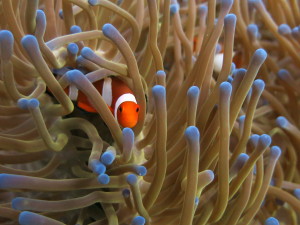
Moray eels slide through crevasses in the rock, watching you float by as they show their full mouth of teeth.
Each dive presents a new environment and the unique beauty of each location is unlike anything we’ve seen living on land.
I’ve seen pictures taken by scuba divers before and so I had some idea of what to expect below the surface. What I didn’t expect, however, was that learning to scuba would remind me of some key lessons I’ve learned about location independence.
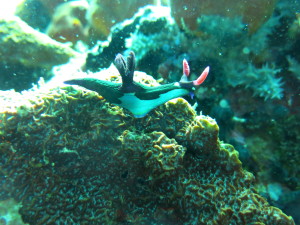
Jumping in the water has parallels to taking a leap to the far side of the world; new environment, unique experiences, new opportunities, etc.
Here’s a few things I learned from my scuba certification that are important for someone to understand if they are experimenting with location independence.
1. Do A Pre-Dive Safety Check
It doesn’t matter if it’s your fifth dive or if you’re a veteran tech diver. You always conduct a pre-dive safety check before jumping in the water.
This involved checking that your gear is all working correctly, confirming you have air pressure, and adjusting your weights to provide proper balance. There’s a pre-determined list of steps you follow, and missing even a few of them could lead to potentially fatal surprises occurring underwater.
Diving into location independence is similar to diving into the ocean. You’re entering a new environment that is, in general, safe and predictable.
If, however, you haven’t done your background research or double-checked your plans, you can get into trouble.
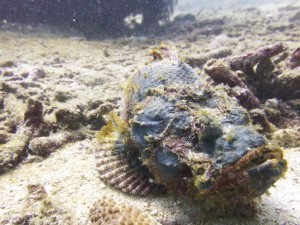
A ‘pre-location independence’ safety check could involve making sure you’ve got…
-
Savings In The Bank – In case your initial income streams don’t function as planned
-
Income – Are you getting a steady flow of cash that you can bring with you on the road?
-
A Growing Business – Are you working on something that has big potential in the future?
-
Local Contacts – Do you know anyone in the country you’re traveling to who can help you if you get in trouble?
I made sure that I had savings in my bank account before I hit the road. This cushion saved me when I ran into trouble and needed money quickly in Thailand.
From my experience, not amassing any savings before leaving home is like diving without any oxygen in your scuba tank. You’re just praying that you’ll find what you need on the trip.
Running out of air underwater or running out of money in a foreign country are both experiences best avoided.
2. Always Check Your Numbers
When you go diving you always need to keep an eye on multiple gauges and dials to make sure you’re safe.
-
You need to watch your air pressure constantly to make sure you don’t run out of oxygen.
-
Your depth gauge keeps you from diving too deep.
-
A dive computer continually calculates how much time you can remain at a certain depth before risking unsafe nitrogen buildup.
-
Your compass helps you navigate underwater without getting lost.
Ignoring any of these numbers, sometimes even for just a few seconds, can lead to dangerous consequences. Especially challenging is that in an environment that is so beautiful and distracting, it’s easy to forget to check your gadgets.
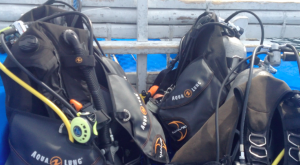
When you go location independent you need to watch your numbers in a similar fashion.
How much money do you still have left in savings. Is that number going down? If so, how much time do you have left before you run out?
Are you earning an income? Is it above or below your average spending?
How many days do you have left on your visa? A visa overstay can cost you a lot!
I paid nearly $400 to the Thai government for a visa overstay when I left the country and entered Laos. It was a stupid mistake, but I made it because I got my visa stamp, put my passport in my bag, and didn’t check to expiration date until it was too late.
Checking the date even once or putting a calendar reminder on my phone would have saved me a lot of cash!
Just like when you’re diving, there are many fun and exciting things to distract you from the numbers when you’re on the road. If you don’t keep track, however, you can get yourself in trouble!
3. If You Don’t Have Fun, There’s No Point
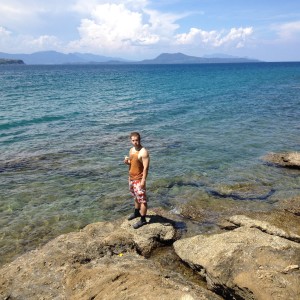
Divers go diving and travelers go traveling because they want to have fun! It’s a trill to be in a new environment. The reason we do what we do is so that we can have some experiences that we can’t get at home.
On my first dive in the ocean I was vigilant about checking my gear as frequently as possible. It was important for my own safety AND if at any point I didn’t have control of the situation I would have failed the course!
On my third dive, however, when I had become used to watching the dive clock, depth sensor, and nitrogen safety timer reflexively, I was able to really enjoy the dive in a way that wasn’t possible earlier.
Knowing that my numbers would all remain in safe ranges for a few minutes, I was able to relax and glide over the underwater terrain with the interest and curiosity of a child.
Behind every coral head was a new life form.

Rolling over the crest of an underwater hill I floated over a green field of sea grass with herds of fish let out to pasture.
Passing a deep valley I saw a turtle resting on the sea floor.
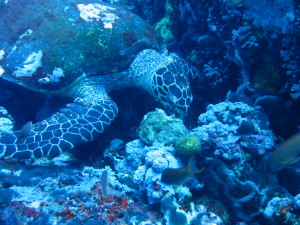
I watched as a amorphous ball of brightly striped fish pulsed as I slowly kicked past them.
After a few minutes I would check my numbers again and they would all be at the levels I expected.
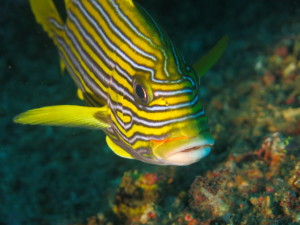
Just like scuba diving, life on the road is always in a state of flux, and it can be stressful if you’re worried about money, your visa, or anything else. You need to learn to enjoy your travels in order to make them worthwhile.
When you scuba dive, your oxygen is always going down and your dissolved nitrogen levels are always increasing.
When you travel you are always spending money and your visa is always getting closer to expiration.
If you never let yourself relax so you can enjoy your time on the road, there’s almost no reason for having left home.
It doesn’t make sense to go diving if you are so worried about your gauges that you never have fun, and it doesn’t make sense to fly to the far side of the world if you’re going to freak out about money every day!
You need to learn to relax in an ever changing world. Only then can you enjoy the beautiful moments presented to you.
Conclusion
There are many parallels between scuba diving and living the location independent lifestyle.
Planning your trip, checking your numbers, and making sure you enjoy yourself are important factors for both.
Are there any sports or activities you take part in that have taught you a lesson relevant to traveling, business, or location independence?
Tell us about them in the comments below, on Facebook, or on Twitter @Nico Jannasch.
